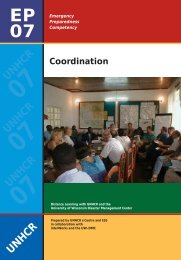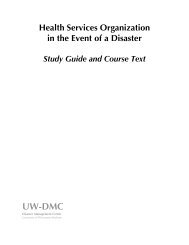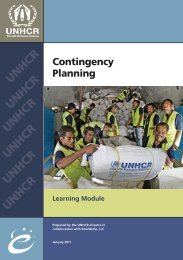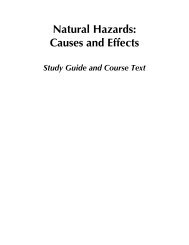Managing External Relations - Disaster Management Center ...
Managing External Relations - Disaster Management Center ...
Managing External Relations - Disaster Management Center ...
You also want an ePaper? Increase the reach of your titles
YUMPU automatically turns print PDFs into web optimized ePapers that Google loves.
Organisations in Emergencies<br />
Annex<br />
2 Role of UN Agencies and Other<br />
United Nations Bodies<br />
The Office for the Co-ordination of Humanitarian Affairs (OCHA, formerly<br />
DHA) works to co-ordinate the collective efforts of the international community,<br />
particularly of the UN system, to reduce the human suffering and material<br />
damage caused by natural disasters and emergencies. OCHA addresses security,<br />
political and humanitarian concerns by advising the Secretary General, providing<br />
a framework for co-operative efforts, and addressing policy and diplomatic<br />
dimensions of disasters and emergencies. OCHA serves as a focal point for<br />
information and action in emergencies, including fielding inter-agency assessment<br />
missions, issuing consolidated appeals through the Consolidated Appeals<br />
Process (CAP), organising donor meetings and monitoring the status of donor<br />
contributions.<br />
The following is on the World Wide Web at ‘Basic Facts About OCHA’ from<br />
OCHA-Online (http://www.reliefweb.int/ocha_ol/)<br />
Basic Facts about OCHA<br />
OCHA was established pursuant to the adoption of the Secretary-<br />
General’s programme for reform. In accordance with the provisions<br />
of General Assembly resolution 46/182, the Emergency Relief<br />
Coordinator’s functions are focused in three core areas: a) policy<br />
development and co-ordination functions in support of the Secretary-<br />
General, ensuring that all humanitarian issues, including those which<br />
fall between gaps in existing mandates of agencies such as protection<br />
and assistance for internally displaced persons, are addressed; (b)<br />
advocacy of humanitarian issues with political organs, notably the<br />
Security Council; and (c) co-ordination of humanitarian emergency<br />
response, by ensuring that an appropriate response mechanism is<br />
established, through Inter-Agency Standing Committee (IASC)<br />
consultations, on the ground.<br />
OCHA discharges its co-ordination function primarily through the<br />
IASC, which is chaired by the Emergency Relief Coordinator (ERC),<br />
with the participation of all humanitarian partners, including the Red<br />
Cross Movement and NGOs. IASC ensures inter-agency decisionmaking<br />
in response to complex emergencies, including needs<br />
assessments, consolidated appeals, field co-ordination arrangements<br />
and the development of humanitarian policies.<br />
Headquarters staff (New York and Geneva): 137 (50 regular budget<br />
posts; 87 extra budgetary) Core annual budget: $42.4 million<br />
(regular budget $18.4 million, extrabudgetary $24 million) OCHA<br />
field Staff: 51<br />
Information<br />
ReliefWeb (www.reliefweb.int): This Internet website, managed by<br />
OCHA, provides up-to-date information on complex emergencies and<br />
natural disasters collected from over 170 sources. Users from over<br />
150 countries access an average of 200,000 documents each month.<br />
97








